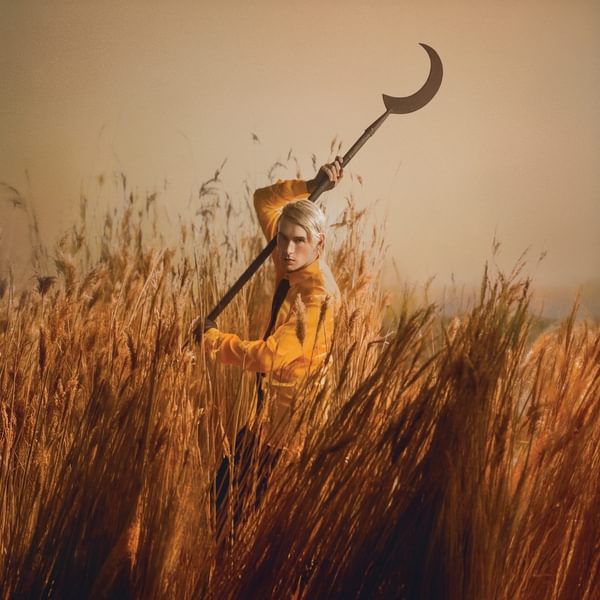
A Quarter of a Century of Sub Pop
Sub Pop. Nirvana, right? Grunge, right? Well, right, but that’s just the surface you’re scratching, kiddo.
To celebrate the label’s 25th year, we’ve had a go at compiling a brief history (or introduction, overview, call it what you like) that’s intended as a guide for people who might know Sub Pop for Nirvana, but little else. This, just ten reasons why Sub Pop is rather remarkable, is based on the assumption that if you don’t know Nirvana, there are probably articles you’d rather be reading anyway.
1) It’s the best university assignment ever
The story of quitting college to follow a rock and roll dream is a familiar one, but Sub Pop founder Bruce Pavitt went about things in the opposite manner. His label’s name was shortened from that of a radio show that became a zine he authored in the early 1980s called Subterranean Pop, a kindred spirit of Sniffin’ Glue before it and Maximumrockandroll after that focused its attention squarely on the burgeoning post punk, hardcore, noise and proto-grunge music being released by local contemporary DIY labels. Whilst its contents hardly seemed academic, there was a much more bookish purpose to its creation – Pavitt got course credit from Evergreen State College in Olympia, Washington for every issue. Only a handful of runs in, he’d come across enough amazing sounds to justify releasing accompanying compilation tapes. After nine issues, releasing music rather than commenting on it took precedence. Sub Pop the label was tentatively born with 5,000 pressings of a vinyl-only compilation – the now highly sought-after Sub Pop 100 – in 1986. Its first track was a spoken word (alright, screamed) intro from Steve Albini, with seals of approval not coming much higher.
Steve Albini – Spoken Word Intro Thing:
2) They made Seattle cool (even before Frasier)
Pavitt worked at a record store called Fallout in the musically thriving Washington city of early 1980s Seattle. He also had a dedicated Sub Pop show on KCMU radio, where he’d meet fellow presenter and subsequent business partner Jonathan Poneman (they both went full time with Sub Pop in 1988, hence this quarter-century anniversary). The city blessed them with flagship bands like Mudhoney and Nirvana – who, though formed in Aberdeen, were regulars on the scene – and they responded in kind. Though its gaze was certainly not narrow, Sub Pop has always been synonymous with alternative rock in Seattle. They were especially supportive in its formative stages, for example flying Melody Maker’s Everett True over all the way from the UK in the hope that he’d whip the British press into a suitable frenzy over the sounds he found in their city. Of course, he duly did. Their support of the locale continues to this day, with one of their finest recent signings, hip hop wizards Shabazz Palaces, also counting themselves Seattle natives. But more on them later. For now, perhaps the defining Seattle grunge song – Mudhoney’s ‘Touch Me I’m Sick’:
{pagebreak}

3) Waiting for the postman in 1988 must have been pretty exciting
As absurd as the idea seems now, in 1988 people still bought singles, though perhaps if they were still of the calibre of those released as part of the initial Sub Pop Singles Club, the format would currently be regarded with less derision. Despite its very first release – Nirvana’s debut single ‘Love Buzz’ – being its most famous, the list of artists who released what are now (to use a phrase I once saw on a sticker adorning a second hand copy) ‘rarer-than-rocking-horse-shit’ 7”s through the thing is astonishing: Fugazi, Sonic Youth, The Afghan Whigs, Tad, Pussy Galore, Dwarves, Jon Spencer, Lou Barlow, Soundgarden, Royal Trux and a ton of others all had their names on the roster. If you were a subscriber to the service (a group that numbered 2,000 in 1990), you got one of them delivered to your door each month. The fact that such a thing no longer exists makes me want to punch strangers. Here’s an amazing Sub Pop Singles Club entry that isn’t ‘Love Buzz’:
The Flaming Lips – Drug Machine:
4) The darker corners of the discography are just as amazing as the shining successes
Though the Singles Club discography quoted above shows they had a knack for picking up early on bands who’d later go on to worldwide renown, cult concerns are something that’s gone right through the label’s history. The globe might be less awash with Codeine or Wolf Parade fans than people with Soundgarden albums, but the Codeine and Wolf Parade fans are likely the sort who could give you convincing reasons why they’re infinitely better. It doesn’t stop there. Dinosaur Jr. fan? Dude, they’re not a patch on Sebadoh. Like Sunn O)))? Come on, it’s just an Earth rip off. Psychocandy your favourite Jesus and Mary Chain album? It’s cool and all, but you’ve gotta hear Munki… Conversations such as these are common with people who know the label’s back catalogue inside out, and they’re as annoying as they are enlightening. Which makes them even more annoying. This nine minute lo-fi gem is a case in point:
Beat Happening – Godsend:
5) Mark flippin’ Arm works in their warehouse
It’s a sad fact of modern times that being in a band as fucking awesome as Mudhoney might not pay your bills all year round. This was once news to me, but something singer Mark Arm knows all too well; for the past near-decade, he’s worked a 9-5 as manager of Sub Pop’s warehouse, shipping releases from the same imprint that continues to release a slew of his own music to shops and individual music nerds around the world. He could do Mudhoney full time, but would have to take the band on the road a lot more, apparently. And Mark’s past fifty now, so will stick to the day job, thanks. It actually seems kinda cool, as does the fact that if you order Mudhoney records from Sub Pop’s store, it’s only their bloody singer who’ll be sending them out to you. He’s been busy carting around boxes of the fine new Low album of late, so here’s a track from that:
Low – Just Make It Stop:
{pagebreak}

6) You still see people in their t-shirts, and they don’t look like prats
“We learned early on that probably the best way we could spend promotional money was to make a profit having other people wear our logo,” Pavitt has said of the t-shirts that are still ubiquitous at festivals, dive bars and student unions the world over. The design was so striking and so indicative of a fine musical taste that slapping it on a shirt proved hugely popular, so much so that there was a time early on that such t-shirts outsold Sub Pop’s actual records. Other iconic t-shirts include the similarly time-tested ‘Loser’ tee, and, in a sign that they weren’t above taking the piss out of themselves, one that simply read “What Part of ‘We Don’t Have Any Money’ Don’t You Understand?”, printed when they were at the height of their financial difficulties. Knowing the shirts sold well, they pressed them to make cash. It’s an echo of an early DIY approach reflected in the reply to the ‘Can I get a t-shirt?’ question in the well worth reading FAQ section of their website:
“Show some initiative, dammit! When we were kids, we made our own t-shirts with magic markers and kitchen midden. And we could only do it by candle-light because no one could afford to pay for sunlight back then, let me tell you…”
7) They’re dreadful with money
Though born of a similar mindset, Sub Pop are not Dischord. Their methods aren’t straight edge punk rock, nor communism, or anarchism – though the end of year financial reports at times would have resembled an anarchic shambles. Sub Pop made mistakes, and had to work, make compromises and ride their luck to get back to full strength. Spiralling legal costs, a distribution business that was leaking money and good old fashioned frivolous spending on rock and roll extravagances left the label entering 1991 having to lay off all but five staff, despite their critical stock never having been higher (a fact that makes the “What Part of ‘We Don’t Have Any Money’ Don’t You Understand?” t-shirt all the more darkly comic). The burgeoning success of the scene they helped to create was as much of a help as a hindrance, with bigger labels looking for The Next Big Grunge Thing able to offer far more cash than the Seattle indie could muster up. Pavitt recalls on their website the race to sign one unnamed artist: “I was told by our head A&R person that they would be happy with a $5,000 advance. Two months later, we were giving them a check for $150,000.”
8) They’re quite clever with money
Though leaving Sub Pop for big nasty major Geffen/DGC could look like an act of selling out on Nirvana’s part, it actually became hugely beneficial for the label that first nurtured them. Finally playing a financial masterstroke, Sub Pop had negotiated a buyout on Nirvana’s contract, which entitled them to royalties on all future albums – of which, Nirvana went on to sell 75 million worldwide. To further aid their return to financial stability, they signed away 49% of the label (not quite a controlling share, you’ll note) to Warner Bros. at the start of 1995. Though mistakes following the agreement would eventually lead to a falling out in which Pavitt and Poneman parted ways, the transition from pure indie to major indie is one that hasn’t stopped Poneman from releasing some of the label’s most daring records.
{pagebreak}

9) It’s about as diverse as a ‘rock’ label gets
Listen, I take issue with the namby pamby electronic crocodile tears of The Postal Service as much as the next guy (what, the next guy loves ‘em? Huh… and the guy after him? Well, I am consistently being told I’m wrong about that one), but I doff my cap to the diversity of the roster nonetheless. For all the more palatable names it claims as its own – such as The Shins, Beach House and Fleet Foxes, some of the hugest indie success stories of recent years – there’s also a commitment to daring, obnoxious alternative rock that you can trace all the way back to around the time of Steve Albini-led noise punks Rapeman’s ‘Inki’s Butt Crack’ 7” and continues through to the present day. With the 2004 signing of Wolf Eyes, Sub Pop – which is now nearly half owned by a big bad major label, let’s not forget – gave a worldwide audience to one of the most confrontational, brutal and fantastic noise bands arguably ever, in a characteristic move that probably made no financial sense but was ridden with artistic integrity. I bet Ben Gibbard either hates them or has nightmares in which they’re the sole soundtrack.
Wolf Eyes – Stabbed In The Face:
10) “We SPs need to stick together”
If you ask me, and let’s pretend you have, Shabazz Palaces’ Black Up could be as important a record as anything the label’s put out. All the things to hate about hip hop aren’t here (overlong records puffed out with skits, bitches, hoes and guns). All the things you want hip hop to do are here (expand your idea of what the genre can be whilst still packing a rhythmic punch that’ll have you picturing canaries flying round your head). And though it’s their first hip hop signing, somehow their residence on the label makes total sense. On signing them, Poneman said:
“It’s in the initials. We SPs need to stick together—and we do. Seattle is our home and that means a lot to both parties. And we’re not stopping at both parties, our professional collaboration will undoubtedly inspire many more parties, with some choice SP music as the soundtrack”.
Whether they end up being one of the shining lights or residing in the darker recesses of the Sub Pop canon remains to be seen. But here’s one reason to be hugely excited:
Shabazz Palaces – Swerve… The reeping of all that is worthwhile (Noir not withstanding):
Well, that’s Sub Pop then. Except of course it isn’t, is it? The thing’s been going for 25 flippin’ years, and this has only scratched the tip of the very top of the surface. All that’s really left to say is that if you haven’t got any records bearing their iconic logo, buy one. And if you have, put one on. Whichever camp you fall into and whichever record you subsequently pick, chances are it’ll be great.
Get the Best Fit take on the week in music direct to your inbox every Friday

Patrick Wolf
Crying The Neck







